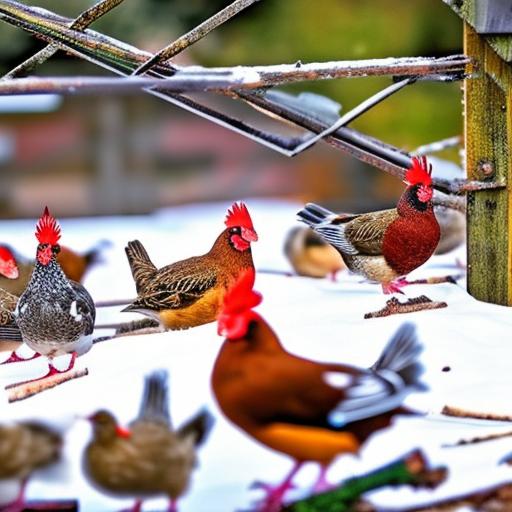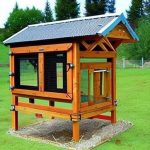Winter care for chickens is an important aspect of raising backyard poultry. As the temperatures drop and the days become shorter, it is crucial to ensure that your chickens are warm and healthy during the colder months. Providing proper care during winter not only helps to keep your chickens comfortable, but it also helps to prevent health issues and maintain egg production. In this article, we will discuss various tips and strategies for winter care for chickens.
Key Takeaways
- Understanding the winter needs of your chickens is crucial for their health and well-being.
- Insulating your chicken coop can help regulate temperature and keep your chickens warm.
- Adequate ventilation is important to prevent moisture buildup and maintain air quality.
- Choosing the right bedding can provide insulation and absorb moisture.
- Heat lamps and heaters can be used, but should be used with caution and monitored closely.
Understanding the Winter Needs of Your Chickens
Chickens are affected by cold weather in several ways. Firstly, they are more susceptible to frostbite, especially on their combs, wattles, and feet. Frostbite occurs when the tissues freeze, leading to tissue damage and potential infection. Additionally, chickens tend to eat more during winter to maintain their body temperature, so it is important to provide them with adequate nutrition. Lastly, chickens may experience a decrease in egg production during winter due to the shorter days and colder temperatures.
Providing proper care during winter is essential to ensure the well-being of your chickens. This includes providing a warm and insulated coop, adequate ventilation, suitable bedding, warm water and food, and keeping your chickens active. By understanding the specific needs of your chickens during winter, you can take the necessary steps to keep them healthy and comfortable.
Insulating Your Chicken Coop
Insulating your chicken coop is crucial for maintaining a warm environment for your chickens during winter. Proper insulation helps to retain heat and prevent drafts, keeping your chickens cozy and comfortable. Insulation also helps to regulate the temperature inside the coop, preventing extreme fluctuations that can be harmful to your chickens.
There are several ways to insulate your chicken coop. One option is to use insulation boards or foam panels on the walls and ceiling of the coop. These materials provide excellent insulation and can be easily installed using screws or adhesive. Another option is to use straw bales or hay to insulate the coop. These natural materials provide good insulation and can be stacked around the walls of the coop. Additionally, sealing any gaps or cracks in the coop with caulk or weatherstripping can help to prevent drafts.
Providing Adequate Ventilation
While insulation is important, it is equally crucial to provide proper ventilation in your chicken coop during winter. Ventilation helps to remove moisture and ammonia from the coop, which can lead to respiratory issues in chickens. It also helps to prevent the buildup of harmful gases and odors.
To provide adequate ventilation without letting in too much cold air, it is recommended to install vents near the roofline of the coop. These vents should be covered with mesh or hardware cloth to prevent predators from entering. Additionally, it is important to ensure that the vents are not blocked by snow or ice during winter. Regularly check and clean the vents to ensure proper airflow.
Choosing the Right Bedding
Choosing the right bedding for your chickens is important for their comfort and health during winter. The bedding helps to insulate the coop floor, keeping it warm and dry. It also provides a comfortable surface for your chickens to rest and walk on.
Straw and wood shavings are popular bedding materials for chickens during winter. Straw provides good insulation and absorbs moisture well, while wood shavings are soft and comfortable for chickens. Avoid using materials such as hay or newspaper, as they do not provide adequate insulation and can become damp easily.
Using Heat Lamps and Heaters

Heat lamps and heaters can be used in a chicken coop to provide additional warmth during winter. However, it is important to use these devices safely to prevent fires and injuries.
When using heat lamps, make sure they are securely mounted and positioned away from flammable materials such as bedding or feathers. Use a heat lamp with a guard or cage to prevent chickens from coming into direct contact with the bulb. It is also recommended to use a thermometer to monitor the temperature inside the coop and adjust the heat lamp accordingly.
If using a heater, choose a model specifically designed for use in a chicken coop. These heaters are usually thermostatically controlled and have safety features such as automatic shut-off in case of overheating. Follow the manufacturer’s instructions for installation and operation.
Providing Warm Water and Food
Providing warm water and food is essential for your chickens’ well-being during winter. Chickens need access to fresh water at all times, and it can be challenging to prevent it from freezing in cold temperatures.
One option is to use heated waterers or heated bases for your chicken’s water containers. These devices keep the water from freezing, ensuring that your chickens have access to clean and fresh water. Another option is to provide warm water multiple times a day by replacing frozen water with warm water.
Similarly, chickens may benefit from warm food during winter. You can provide warm meals by adding warm water to their feed or offering warm treats such as cooked vegetables or grains. Warm food not only helps to keep your chickens nourished but also provides additional warmth.
Keeping Your Chickens Active
Keeping your chickens active during winter is important for their physical and mental well-being. Cold temperatures and limited outdoor activities can lead to boredom and lethargy in chickens.
To keep your chickens active, provide them with opportunities for exercise and entertainment. This can include providing perches or roosts at different heights, hanging toys or treats for them to peck at, or scattering scratch grains or mealworms in the coop for them to search for. Additionally, allowing your chickens some supervised time outside on sunny winter days can provide them with fresh air and stimulation.
Preventing Frostbite and Other Cold-Related Health Issues
Frostbite is a common health issue in chickens during winter, especially on their combs, wattles, and feet. To prevent frostbite, it is important to provide a warm and draft-free environment for your chickens. Insulating the coop, providing proper ventilation, and using heat lamps or heaters can help to prevent frostbite.
Other cold-related health issues in chickens include respiratory infections and decreased egg production. To prevent respiratory infections, ensure that the coop is clean and dry, with proper ventilation. Providing a balanced diet with adequate nutrition can help to maintain egg production during winter.
Conclusion and Recap of Tips
In conclusion, winter care for chickens is crucial for their well-being and health during the colder months. Understanding the specific needs of your chickens during winter and taking the necessary steps to provide proper care can help to keep them warm, healthy, and productive.
To recap the tips provided in this article:
– Insulate your chicken coop to retain heat and prevent drafts.
– Provide adequate ventilation to remove moisture and harmful gases.
– Choose suitable bedding materials that provide insulation and absorb moisture.
– Use heat lamps or heaters safely to provide additional warmth.
– Provide warm water and food to prevent freezing.
– Keep your chickens active with exercise and entertainment.
– Take steps to prevent frostbite and other cold-related health issues.
By following these tips, you can ensure that your chickens stay comfortable and healthy throughout the winter season.
If you’re looking for tips on how to keep your chickens warm during the winter months, you’ll definitely want to check out this helpful article on Poultry Wizard. They provide valuable insights and recommendations on using a heater for your chicken coop. With their expertise, you can ensure that your feathered friends stay cozy and comfortable even in the coldest temperatures. Don’t miss out on this essential resource – click here to read more: https://poultrywizard.com/keeping-chickens/heater-for-a-chicken-coop/.
FAQs
What temperature range is safe for chickens in winter?
Chickens can tolerate temperatures as low as 20°F, but it is recommended to keep their coop between 32°F and 50°F.
What are some ways to keep my chicken coop warm in winter?
You can insulate the coop, use a heat lamp or ceramic heater, provide extra bedding, and seal any drafts.
Is it safe to use a heat lamp in the chicken coop?
Yes, but it is important to use a heat lamp designed for poultry and to keep it at a safe distance from any flammable materials.
What type of bedding is best for keeping chickens warm in winter?
Straw, hay, or pine shavings are good options for bedding as they provide insulation and absorb moisture.
How can I prevent my chicken’s water from freezing in winter?
You can use a heated waterer or place a heated base under the waterer to prevent it from freezing.
Do I need to change my chicken’s diet in winter?
No, but it is important to make sure they have access to fresh water and to provide them with extra calories to help them stay warm. This can be done by offering them scratch grains or increasing their regular feed.
Meet Walter, the feathered-friend fanatic of Florida! Nestled in the sunshine state, Walter struts through life with his feathered companions, clucking his way to happiness. With a coop that’s fancier than a five-star hotel, he’s the Don Juan of the chicken world. When he’s not teaching his hens to do the cha-cha, you’ll find him in a heated debate with his prized rooster, Sir Clucks-a-Lot. Walter’s poultry passion is no yolk; he’s the sunny-side-up guy you never knew you needed in your flock of friends!







